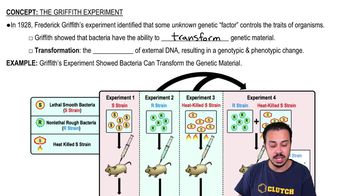The Griffith Experiment exam Flashcards
 Back
BackThe Griffith Experiment exam
1/29
Terms in this set (29)
- Frederick GriffithA scientist who conducted a pivotal experiment in 1928 demonstrating bacterial transformation.
- TransformationThe process by which bacteria uptake external DNA, leading to changes in genotype and phenotype.
- What did Griffith's experiment demonstrate?It demonstrated that bacteria can undergo transformation by uptaking external DNA.
- R strainNon-lethal rough bacteria used in Griffith's experiment.
- S strainLethal smooth bacteria with a capsule, used in Griffith's experiment.
- What happened when Griffith injected mice with the S strain?The mice died because the S strain is lethal.
- Heat-killed S strainS strain bacteria that have been killed by heat and are non-lethal.
- What was the result when Griffith injected mice with the R strain?The mice remained alive because the R strain is non-lethal.
- What was the result when Griffith injected mice with the heat-killed S strain?The mice remained alive because the heat-killed S strain is non-lethal.
- What surprising result did Griffith find in his fourth experiment?The combination of R strain and heat-killed S strain killed the mice.
- What did Griffith conclude from his fourth experiment?The R strain transformed by uptaking genetic material from the heat-killed S strain.
- GenotypeThe genetic makeup of an organism.
- PhenotypeThe observable traits of an organism.
- What did Griffith extract from the dead mice in his fourth experiment?Living S strain bacteria.
- What was unknown during Griffith's time about the genetic material?The exact nature of the genetic material was unknown; it was later identified as DNA.
- Oswald Avery, Maclyn McCarty, and Colin MacLeodScientists who identified DNA as the transforming substance in Griffith's experiment.
- What was the initial skepticism about DNA?Many scientists believed proteins were the genetic material because more was known about proteins than DNA.
- What is the significance of Griffith's experiment?It laid the groundwork for identifying DNA as the genetic material.
- What does the term 'capsule' refer to in the context of S strain bacteria?A smooth surface layer that makes the S strain lethal.
- What did further experiments after Griffith's work aim to prove?That DNA, not proteins, is the genetic material.
- What is the importance of the R strain's rough surface?It makes the R strain non-lethal.
- What did Griffith's experiment help to identify?That some unknown genetic factor controls the traits of organisms.
- What was the outcome when Griffith combined the R strain and heat-killed S strain?The combination killed the mice, indicating transformation.
- What did Griffith's findings contribute to?The foundational understanding of genetic inheritance and transformation in microorganisms.
- What did Griffith's experiment show about bacterial DNA?Bacteria can uptake external DNA from their environment.
- What was the key finding from Griffith's fourth experiment?Living R strain bacteria transformed into lethal S strain bacteria.
- What was the role of heat in Griffith's experiment?Heat was used to kill the S strain bacteria, making them non-lethal.
- What did Griffith's experiment suggest about genetic material?That genetic material could be transferred between bacteria.
- What was the broader impact of Griffith's experiment on science?It paved the way for the discovery of DNA as the genetic material.

